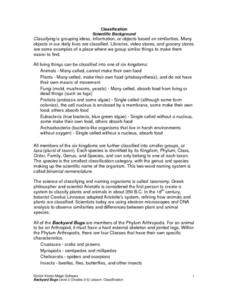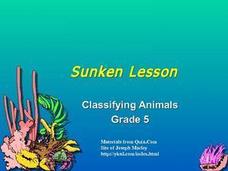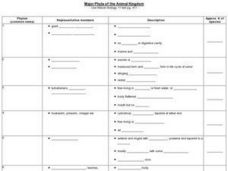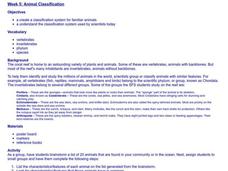Curated OER
Invertebrate Diversity
Comparative anatomy prevails in the lesson exploring diversity among invertebrates. Biologists examine physical characteristics of an earthworm from phylum annelida and a meal worm from phylum insecta. They also inspect a cricket and a...
Curated OER
Backyard Bugs
Explore the concept of scientific classification and the similarities and differences between plant and animal species. Your class will participate in hands-on activities by investigating dichotomous keys and classifying their shoes. To...
Curated OER
Organizing Life
In this taxonomy worksheet, students learn about Linnaeus' system for classifying living things. Students complete 2 fill in the blank and 2 short answer questions based on what they read.
Curated OER
Sunken Lesson: Classifying Animals
This PowerPoint features vocabulary and key concepts related to animal classification. Information about levels of classification, traits common to vertebrates and invertebrates, and a description of metamorphosis are included. The text...
Curated OER
Spectacular Squid
Students study squid including what family they are in. In this exploratory lesson students view a video, answer questions and complete an activity on squid.
Curated OER
Cool Corals
Students research questions pertaining to ecology and biology of shallow and deep water corals. In this investigative activity student get into groups and design questions that will expand their knowledge of corals.
Curated OER
Biodiversity
In this biodiversity activity, students sort and classify animals by their observable features using a dichotomous key. Students then respond to questions about complete and incomplete metamorphosis.
Curated OER
Major Phyla of the Animal Kingdom
In this animal kingdom worksheet, students compare and contrast the 10 different phyla including the description and approximate number of species found in each one. This worksheet is a graphic organizer.
Curated OER
Modern Classification
In this modern classification worksheet, 9th graders describe ways scientists determine an organism's phylogeny. Then they explain what the animal and fungi kingdoms have in common and how they differ. Students also classify some cells...
Curated OER
BJU Life Science 2
In this biology worksheet, learners locate and identify various vocabulary terms related to the life sciences. There are thirteen words located in the puzzle.
Curated OER
Invertebrates and Vertebrate Evolution
Students explore the major characteristics of the major animal phyla. They describe adaptive features that have contributed to the success of animals on land. Students explain how primate evolution provides a context for understanding...
Curated OER
Animal Classification
Students list characteristics and features of animals found in their community. They then group the animals according to how they are similar and different and create names for each group. They then create a chart of their...
Curated OER
Everything in Its Place: Science Classification
Students investigate the system of classification for living things through the sixteen lessons of this unit. The five kingdoms of monerans, protists, fungi, plants, and animals form the basis of several experiments as the similarities...
Curated OER
Observation of a Living Earthworm
Sixth graders examine earthworms and their parts. In this earthworm activity students complete a lab worksheet on the earthworm and test its response to certain factors.
Curated OER
Sponges - A Coloring Worksheet
In this sponges instructional activity, students read the information about sponges. Students answer the provided questions about the reading passage. Students color the illustration at the bottom of the page.
Curated OER
Classification of Living Things
In this biology instructional activity, students identify and locate various vocabulary terms relating to the classification of living things. There are 28 biology terms located in the word search.
Curated OER
Show Some Backbone and Teach Invertebrates
Fifth graders identify two similarities and two differences between two phyla, assign fictitious invertebrate to its phylum and explain why it belongs in that grouping, and construct member of given phylum and explain why it should be...


















